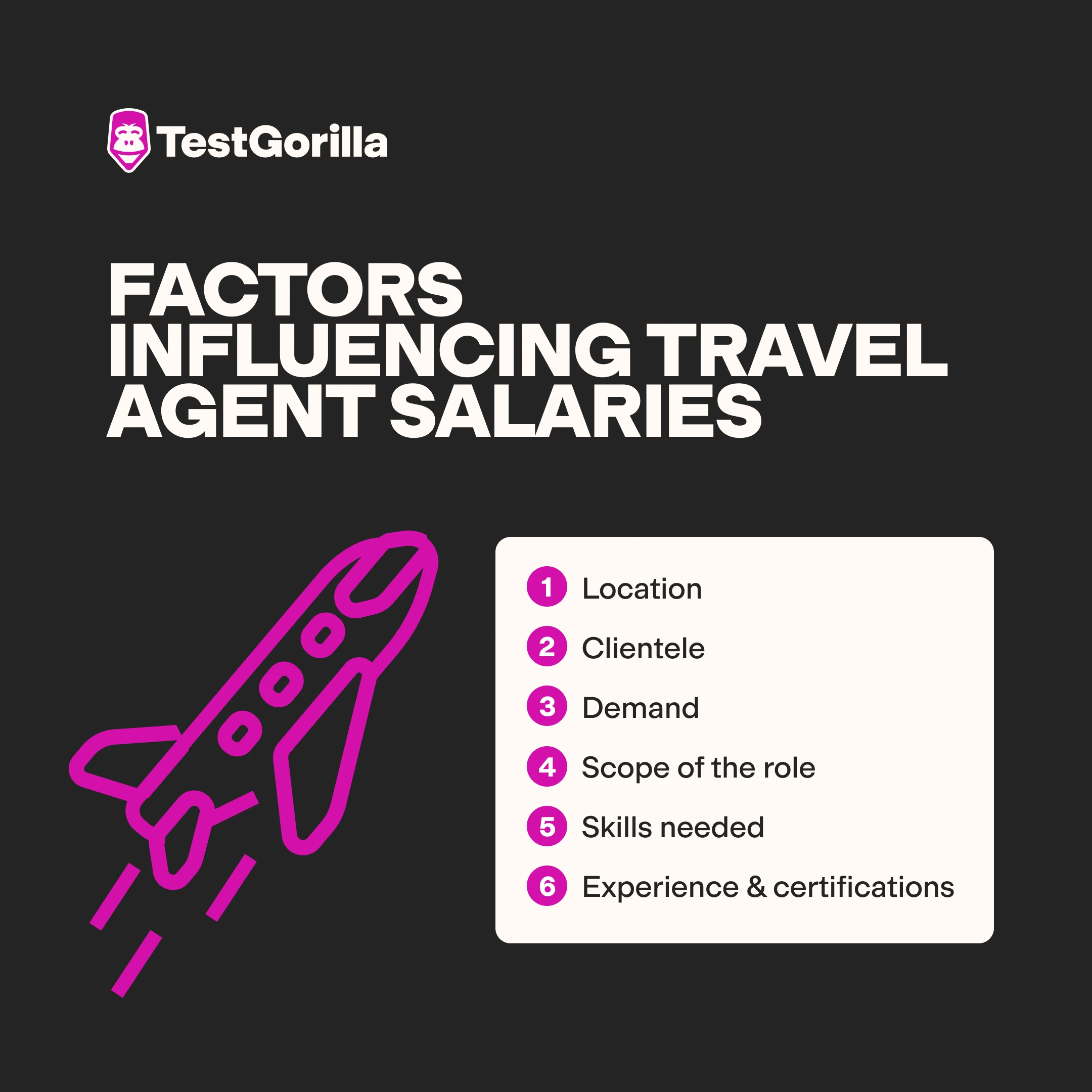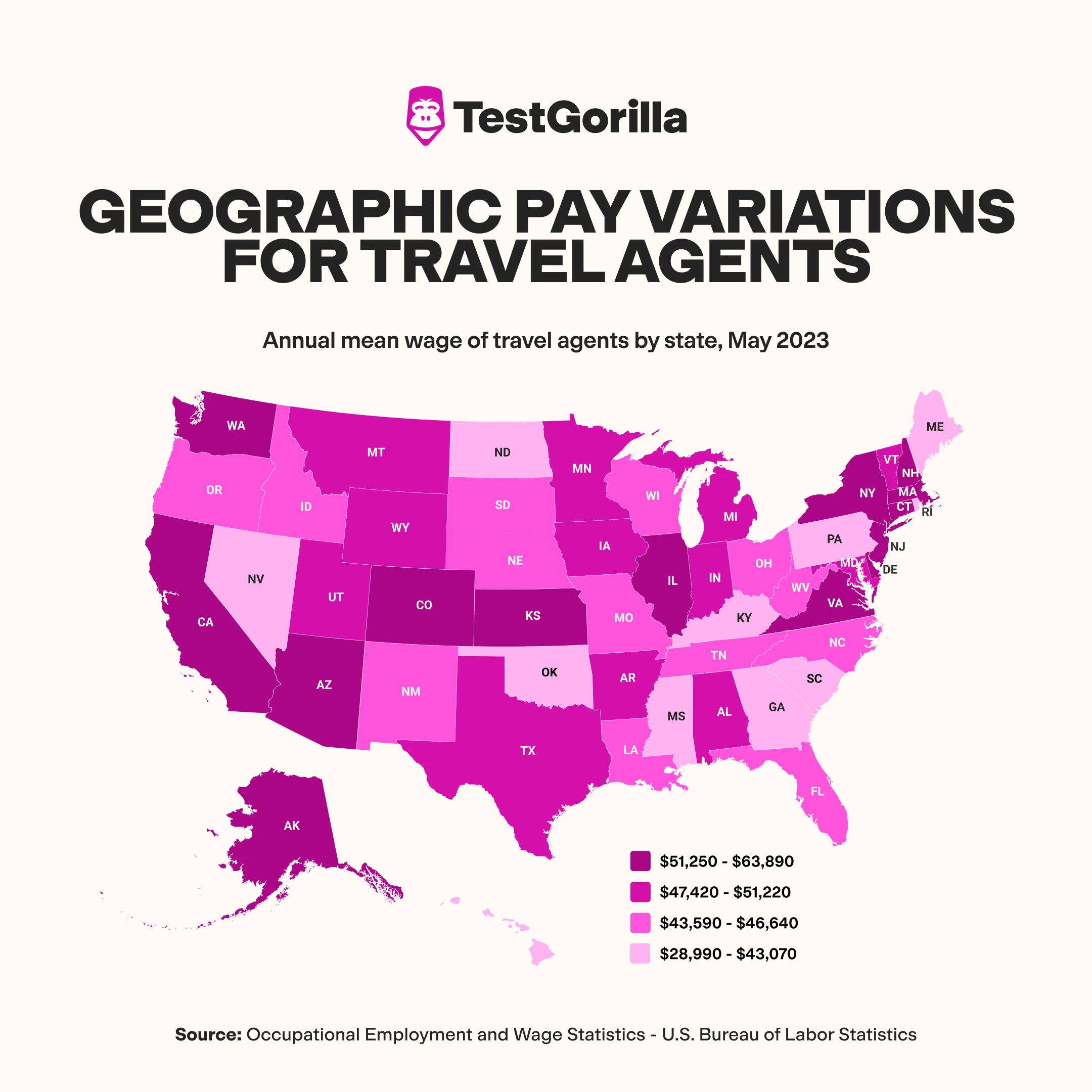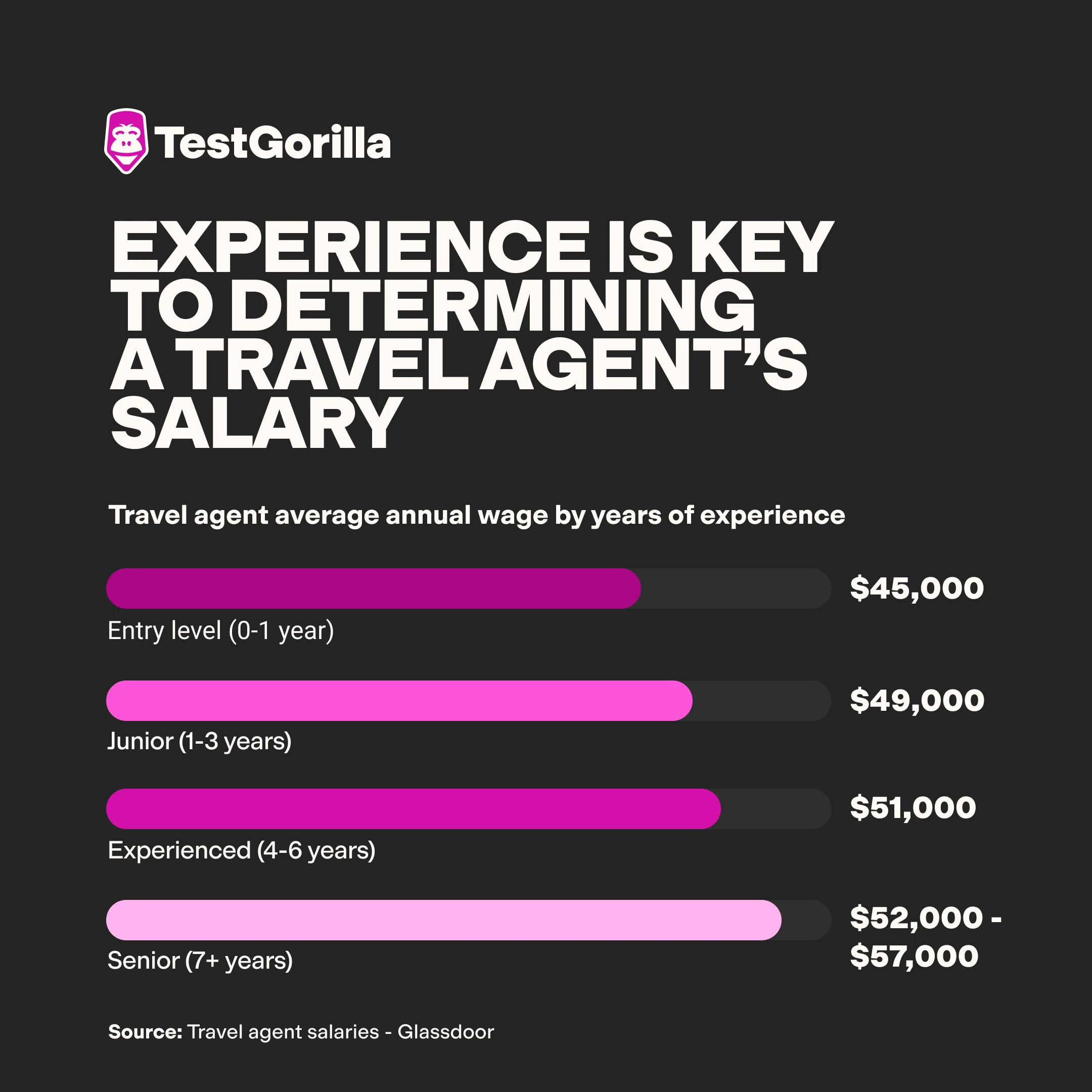There’s a growing talent shortage in the travel industry. According to a recent panel discussion at the Affluent Travel Collection (ATC) Symposium in Miami, many seasoned advisors are retiring, leaving companies scrambling to find skilled candidates.
This high demand has sparked fierce competition for talent, and underpaying your agents or job candidates is sure to send them knocking on other doors.
Luckily, we're here to ensure that doesn't happen.
In this article, we share the latest salary benchmarks and tips on crafting an appealing benefits package, so you know what to pay a travel agent and how to secure the best candidates for your business.
How we researched this topic
We've relied only on trusted data sources and reputable websites to provide the most relevant and accurate information.
First, we referenced the Bureau of Labor Statistics's (BLS) Occupational Employment and Wage Statistics (OEWS) report for travel agents. This data comes from a survey of approximately 1.1 million US establishments between November 2020 and May 2023.
We also used websites like Glassdoor for key insights into travel agent wages and benefits and how these differ by education and experience.
Key takeaways
As of 2023, travel agents in the US earn an average of $50,040 per year.
Wages vary by location, industry, clientele, etc. For instance, DC-based agents and luxury travel agents make more than those in Georgia or working for the government.
Certifications like the Certified Travel Associate (CTA) boost earning potential.
In addition to standard benefits, travel agents get industry perks, such as familiarization trips and travel discounts.
National salary statistics for travel agents
Pay metric | Annual wage (USD) | Hourly wage (USD) |
Median | $47,410 | $22.79 |
Mean | $50,040 | $24.06 |
Top 10% earners | $69,640 | $33.48 |
Bottom 10% earners | $30,580 | $14.70 |
Median salary vs. mean salary
To make sense of these numbers, you must understand what mean and median are and how they’re different.
Mean (or average) wage: This is calculated by adding all the salaries and dividing by the number of agents. Outliers – extreme highs or lows – can sway the mean.
Median wage: If you list all travel agent wages in ascending or descending order, the median is the middle number. That means 50% of agents make more, and 50% make less than this number. The median isn’t affected by outliers.
Why does this difference matter?
If most travel agents earn $22/hour but a handful make a disproportionately lower amount of $12/hour, it can bring the overall mean down to $19/hour. But the median will likely stay closer to $22/hour. The mean gives you powerful insights into outliers, but the median is an accurate representation of what most travel agents earn.
Factors influencing salaries
Several factors contribute to the broad range of travel agent wages. Below are a few examples.
Location: Those living in high-cost-of-living areas like Chicago, IL, will have a higher salary than those living in places like Louisville, KY, where rent, utilities, and transport costs are cheaper.
Clientele: Travel agents who deal with corporates and businesses with big budgets, high stakes, and tight deadlines will likely earn more than agents working for individual clients.
Demand: When tourism is in high demand, travel agents can make more money. For instance, hourly agents might earn more or less depending on the season. Additionally, if there's a surging demand for certain types of travel, like luxury travel or eco-tourism, agents specializing in these areas demand higher pay.
Scope of the role: Agents who curate end-to-end customer experiences or specialize in high-end luxury travel, such as cruises or safaris, have a higher earning potential than generalists who handle only basic tasks, such as flight and hotel bookings.
Skills needed: Employees who are fluent in multiple languages, great at negotiating exclusive deals, or proficient in advanced booking software might earn more than agents with more basic skills.
Experience and certifications: Certain credentials, like being a Certified Travel Associate, or having many years of experience in the travel space can boost earning potential compared to those with fewer years of experience and no formal qualifications.
Geographic pay variations
This is how travel agent salaries vary across locations.
5 highest-paying states
The BLS report lists the below areas as the five highest-paying locations for travel agents:
District of Columbia (DC)
Colorado (CO)
Connecticut (CT)
New Hampshire (NH)
Arizona (AZ)
5 lowest-paying states
Meanwhile, these states pay travel agents the least:
Mississippi (MS)
Oklahoma (OK)
Maine (ME)
Rhode Island (RI)
Georgia (GA)
Why the differences in pay across states?
Some of these differences can be attributed to differences in the cost of living. According to Zillow, agents living in Colorado pay a median of $2,149 per month in rent, compared to Rhode Island, which has a monthly median rent of $1,900.
Additionally, individuals in states like Connecticut have an average higher disposable income than other locations, signaling increased demand for leisure and luxury travel.
Industry-specific pay data
Here are the latest average travel agent salaries by industry:
Industry | Annual mean wage (USD) |
Information | $77,180 |
Professional, scientific, and technical services | $64,597 |
Finance and insurances | $63,983 |
Credit intermediation and related activities | $62,295 |
Management of companies and enterprises | $55,886 |
Transportation and warehousing | $54,093 |
Other services (except federal, state, and local | $53,653 |
Cross-industry, private ownership only | $50,050 |
Cross-industry, private, federal, state, and local government | $50,040 |
Arts, entertainment, and recreation | $47,928 |
Federal, state, and local government | $41,027 |
Real estate and rental and leasing | $34,925 |
We drilled further into the data to see the highest and lowest-paying sectors.
5 highest-paying sectors
Here are the sectors that pay travel agents the most.
Sector | Mean annual wage |
Air transportation | $71,770 |
Temporary help services | $67,880 |
Management, scientific, and technical consulting services | $66,350 |
Professional, scientific, and technical services | $65,090 |
Insurance carriers | $64,490 |
Let's explore why agents from these sectors are better paid.
Air transportation: Airline travel is expensive, so agents must be skilled at accurate scheduling, making time-sensitive arrangements, and, in many cases, supporting a wide range of clients by adhering to visa regulations and other criteria.
Temporary help services: These agents manage travel for contract workers who frequently move between job sites. They often juggle multiple bookings, adapt to short-notice changes, optimize costs, and balance tight company budgets.
Consulting services: Agents in this sector are paid more to meet high standards, maintain confidentiality, and seamlessly executive complex itineraries for professionals working in the consulting space and attending global projects and negotiations.
Professional, scientific, and technical services: These agents must make precise travel arrangements for field researchers and technical experts. Their higher wages are linked to the specialized knowledge they need to transport equipment and access remote areas.
Insurance carriers: Travel for insurance professionals, such as adjusters or executives, often involves urgent, last-minute arrangements for disaster sites or critical meetings to minimize claim delays, leading to better compensation.
5 lowest-paying sectors
Sector | Mean annual wage |
Real estate, rental, and leasing | $34,820 |
Federal, state, and local government | $40,985 |
Amusement, gambling, and recreation | $41,030 |
Arts, entertainment, and recreation | $41,610 |
Scenic and sightseeing transportation, land | $43,210 |
Here’s why these sectors pay less:
Real estate and rental: The infrequent travel needs in this sector – often limited to property tours and occasional conferences – and lower demand for specialized skills mean that agents make less.
Federal, state, and local governments: Government agencies often work with strict budgets and standardized travel policies that require routine bookings and little customization. That’s why agents receive lower salaries.
Amusement, gambling, and recreation: Travel in this sector is often seasonal, catering to tourists during the holidays rather than high-value clients. Agents also handle group bookings and package deals with limited personalization. These factors contribute to a lower annual wage.
Arts, entertainment, and recreation: These agents support performers or event organizers who pay less due to a lower budget and less need for luxury or complex travel.
Scenic and sightseeing transportation: This sector typically involves local or short-distance travel arrangements, such as day trips. These require minimal planning or expertise, resulting in lower pay for agents.
Pay by experience and education
Next, let’s see how travel agent salaries vary by qualifications and years of experience.
Average annual wage by years of experience
Entry-level (0-1 years): $45,000
Junior level (1-3 years): $49,000
Experienced (4-6 years): $51,000
Senior (7+ years): $52,000 - $57,000
Education and certifications to boost earning potential
These qualifications and certifications can boost a travel agent’s earning potential:
Certified Travel Associate (CTA): This certification awarded by the Travel Institute showcases foundational knowledge in the travel industry and client service.
Certified Travel Counselor (CTC): This advanced certification – also from the Travel Institute – is for experienced agents skilled in leading, marketing, and consulting for all things travel.
Certificate Corporate Travel Executive (CCTE): This certification caters to corporate travel agents and helps them showcase their skills in corporate travel management and business travel.
International Air Transport Association (IATA) Accreditation (IA): This accreditation gives agents access to global booking systems and builds trust with clients.
Not sure which skills and qualifications to include in your travel agent job opening? Check out our free travel agent job description template.
The best insights on HR and recruitment, delivered to your inbox.
Biweekly updates. No spam. Unsubscribe any time.
Benefits beyond salary for travel agents
Here are some common benefits for travel agents:
Medical, vision, and dental: US travel agents usually appreciate this benefit due to the high costs of health insurance. It’s also common to offer plans with global coverage for work-related travels and special sports and experiences like skiing, diving, etc.
Retirement plans, like 401ks: These provide agents with financial security for the future and help them save, which is crucial for this relatively lower-paid role.
Travel discounts: Agents often receive special rates and discounts for their personal holidays.
Familiarization trips: Many agents – especially those passionate about travel – are driven by opportunities to take all-expenses-covered location familiarization trips to better serve their clients.
Paid time off: It’s easy to confuse familiarization and travel trips with holidays, so make sure to provide travel agents with paid time off so they can rest and recover from the high pressures of the job.
Flexible work schedules: Travel agents can usually do their jobs from home, so remote or hybrid working is a great way to attract talent.
Commissions and incentives: Some companies share part of their commissions – for instance, from hotels or airlines – with their travel agents to give them an extra boost of motivation.
Professional development: Tuition reimbursement or sponsorships for certifications like the CTA empower agents to specialize and grow in their roles.
Land the best travel agents with TestGorilla's talent assessments
Offering a competitive salary and benefits can bring tons of great candidates to your door. But you must find an effective way to shortlist and interview those who are both skilled and contribute to your company’s culture. That’s where TestGorilla’s talent assessments come in.
Our library of 400+ science-backed tests lets you quickly and accurately judge your candidates' technical skills, soft skills, cognitive abilities, traits, and more. You can combine up to five tests to create a tailored travel agent assessment. Here's what we recommend:
Technical skills
Language tests
Microsoft Powerpoint test
Social Media Management test
Soft skills
Negotiation test
Cognitive abilities
Critical Thinking test
Personality and culture
Motivation test
Enneagram test, Big 5 (OCEAN, and other personality assessments
These tests, combined with great interview questions, reveal each candidate’s strengths, motivations, work expectations, and areas for development. With this info, you can find someone top-notch to hire and pay them fairly for their contributions.
Sign up for a free account or schedule a live demo with TestGorilla today.
FAQs
Looking for more? Here are our answers to some frequently asked questions.
How does a travel agent get paid?
Travel agents usually earn base salaries from their companies or agencies and commissions from booking hotels, flights, and other experiences.
Do travel agents get free trips?
Yes, but not for personal travel. Travel companies often offer familiarization trips – or “fam trips”– to agents so they can experience destinations, activities, and services firsthand and provide better advice to their clients.
What's the difference between a travel agent and a travel concierge?
A travel agent focuses on generic services such as booking flights, accommodation, and car rentals. A travel concierge provides a more bespoke offering and includes arranging dinners, special activities, and more.
Check out our free travel concierge job description template to learn what skills to look for.
You've scrolled this far
Why not try TestGorilla for free, and see what happens when you put skills first.

















